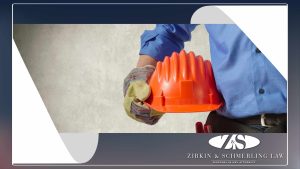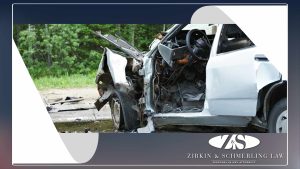Why You Need a Zirkin & Schmerling Maryland Brain Injury Lawyer

Experiencing a brain injury can be a life-altering event, profoundly impacting an individual’s physical, emotional, and financial well-being. Navigating the aftermath of such an injury involves numerous challenges, including medical treatment, rehabilitation, and significant lifestyle adjustments. Amidst these challenges, legal issues often arise, particularly when the injury results from an accident or negligence. In such cases, a brain injury lawyer can be an invaluable ally. Zirkin & Schmerling Law Firm will help you get the compensation you deserve.
A Maryland brain injury attorney specializes in handling cases involving traumatic brain injuries (TBI). They advocate for victims, ensuring they receive the compensation they deserve for medical expenses, and pain and suffering.
In essence, a Maryland attorney not only provides legal representation but also offers support and guidance through a challenging period, allowing victims and their families to focus on recovery.
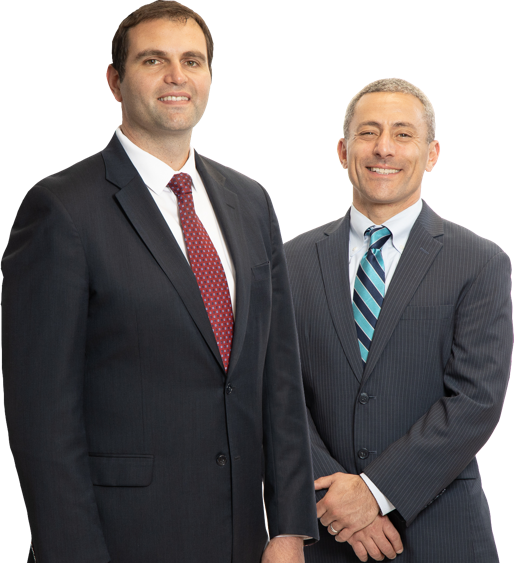
What Is a Traumatic Brain Injury (TBI)?

A traumatic brain injury (TBI) is a brain injury that is so severe it affects the brain’s ability to function correctly.
Brain injuries can occur in many ways, like a fall or car accident, and leave the TBI victim with long-term consequences.
The Centers for Disease Control (CDC) reports over 60,000 TBI-related deaths annually in the U.S., with car accidents being the second leading cause after falls.
For children, older adults, and people with disabilities, brain injuries are often fatal.
Traumatic Brain Injury Symptoms
The Mayo Clinic outlines common symptoms following a head injury:
- Brief loss of consciousness, lasting seconds or minutes
- Persistent drowsiness or fatigue
- Nausea or vomiting
- Blurred vision or ringing in the ears
- Persistent headaches
- Vertigo or dizziness
- Increased sensitivity to light or sound
- Difficulty concentrating
- Feeling disoriented, dazed, or confused
- Changes in sleep patterns, such as insomnia or excessive sleep
- Depression
- Anxiety
- Mood swings
How Do Traumatic Brain Injuries Impact Victims?

Long-term effects of a traumatic brain injury can endure for months, years, or a lifetime and can include:
- Reduced attention span and memory
- Paralysis or loss of basic motor skills
- Communication difficulties
- Loss of bowel or bladder control
- Difficulty with social interactions or relationships
- Changes in personality or behavior
- Sensitivity to environmental stimuli, such as light or noise
- Increased risk of Alzheimer’s, Parkinson’s, or other neurodegenerative diseases
- Executive brain function challenges, such as planning, organizing, and decision-making
- Reduced quality of life and independence
Living with a brain injury can be exhausting, especially for caregivers who are often faced with extensive medical expenses, lost wages, and the emotional toll of seeing a loved one suffer.
Don’t try to do this alone; reach out to the expert personal injury attorneys at Zirkin & Schmerling Law. A traumatic brain injury attorney can file a claim and seek fair compensation for someone else’s negligence.
Our traumatic brain injury attorneys can negotiate with an insurance company to hold the negligent parties responsible.
We help victims recover compensation for injury-related expenses, including medical bills and pain and suffering.
Types of Traumatic Brain Injuries
A Traumatic Brain injury is typically categorized in one of two ways:
- Penetrating TBI: In a penetrating TBI, the skull is compromised. These are the most serious injuries and usually lead to long-term complications and even death.
- Closed Head Injuries: In a closed head injury, the skull is not exposed, and there may only be minor cuts on the skin. However, closed brain injuries can still be severe but tend mostly towards mild or moderate consequences if the injured chooses to seek medical attention immediately.
Aside from an initial classification of open or closed, there can be several different types of traumatic brain injuries that can occur due to a car accident.
Those specific, catastrophic brain injuries include the following:
Contusions: A contusion is bruising or mild bleeding of the brain tissue.
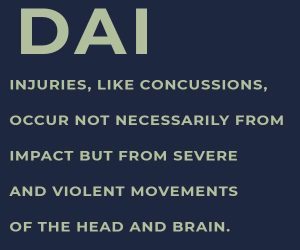
Concussions: A concussion occurs when your head and brain are quickly jolted or shaken. Contusions often accompany concussions.
Diffuse Axonal Injury (DAI): DAI injuries, like concussions, occur not necessarily from impact but from severe and violent movements of the head and brain. When this happens, connections between brain cells tear.
Hematomas: Intracranial hematomas occur when blood vessels are ruptured, leading to blood collection in the brain. There are a few different types of hematomas:
- Subdural: When a clot forms between the brain and the dura.
- Epidural: When a clot forms outside of the brain but is still contained under the skull.
- Intracerebral: When bleeding occurs in the brain tissue caused by a ruptured blood vessel.
- Subarachnoid hemorrhage: When there is a bleed within the layers of the dura.
- Intraventricular hemorrhage: When bleeding occurs in the ventricles of the brain.
Skull Fractures
Fractures: A skull fracture happens when there is a break or a crack.
There are three common types of skull fractures:
- Linear: A linear fracture occurs with a minor hairline fracture or crack.
- Depressed: Depressed fractures occur when part of the skull has caved in or been crushed.
- Basilar: Basilar fractures are cracks that occur at the base of the skull and brain.
Each Zirkin & Scherling Maryland brain injury attorney knows recovering from a TBI is complicated enough on its own, let alone having to deal with filing a brain injury claim or personal injury lawsuit.
How to Determine Liability for a Head Injury in Maryland
If your injury stems from another person’s negligence, you may have grounds for a traumatic brain injury (TBI) lawsuit.
A few examples of negligence leading to a TBI include:
- Reckless or impaired driver causing a car accident
- A business’s poorly maintained property
- A parking lot with no ice removal plan, resulting in a slip-and-fall accident
Financial compensation could be available if you or a family member suffered a TBI due to someone else’s negligent or intentional actions.
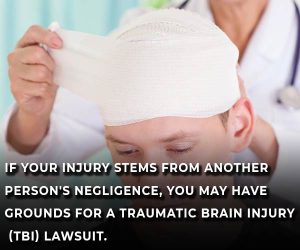
You can typically recover compensation to cover medical expenses, lost wages and benefits, pain and suffering, and other foreseeable losses related to the injury.
In legal terms, proving negligence refers to failing to meet expected standards of care, leading to avoidable harm. While negligence is more common in injury lawsuits, intentional harm can lead to TBIs.
Victims of deliberate acts, such as assaults or criminal violence, face challenging legal processes and should engage an experienced brain injury attorney to ensure the best possible outcome.
Instead of only proving negligence, we must demonstrate the defendant’s negligence and intent, which can be challenging but bolstered by Maryland evidence, including criminal convictions, if applicable.
How Do You Prove Negligence in Traumatic Brain Injury Cases?
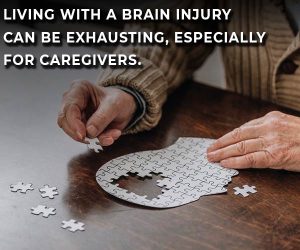
Negligence, a crucial legal concept, consists of four elements that must be proven to establish liability. To succeed in a traumatic brain injury case, we must establish four elements: duty, breach, causation, and damages.
Duty represents the legal responsibility (or defendant’s duty) owed to you by the defendant when the injury occurred.
Breach refers to how the responsible party violated this duty, leading to your head injuries.
Causation demonstrates how the defendant’s breach was the direct cause of your brain injury.
Damages require your personal injury lawyer to prove your injuries and the cost of the harm caused by the negligent party.
Seeking experienced legal counsel is crucial to helping you identify each element and proving negligence leads to your traumatic brain injury.
What It Takes to Prove Negligence in the Most Common TBI Cases

Each type of accident causing a TBI requires different evidence to prove negligence and grounds for your personal injury claim.
Here are a few examples of how your personal injury lawyer will prove negligence in the most common incidents that result in a TBI.
Car, Motorcycle, and Truck Accidents
In auto accident scenarios, a defendant must drive reasonably and adhere to traffic laws. Breaching this duty, such as by running a red light or speeding, constitutes negligence. Establishing causation can be complex, necessitating the demonstration that no other intervening factors caused the accident.
Damages encompass traumatic brain injury cases, other injuries, vehicle damage, other medical treatment expenses, and other losses.
Slip and Fall Accidents
Slip and fall incidents present distinct challenges, as the liable party may not have directly caused the accident. Property owners often bear responsibility for maintaining safe premises. Negligence in these cases arises from their failure to address known hazards or conduct adequate inspections for potential dangers.
Medical Malpractice Injuries
In medical malpractice claims, negligence is assessed against established standards of care. While all four legal elements still apply, additional considerations emerge. Not every medical error constitutes negligence, as treatment outcomes are inherently uncertain.
Proving medical malpractice requires proving how the provided care fell below accepted standards and directly resulted in traumatic brain injury.
Construction and Industrial Accidents
Construction sites pose significant risks for accidents causing traumatic brain injury among workers despite safety measures like hardhats.
Liability allocation depends on various factors, including supervision and site conditions. General contractors often bear responsibility due to their overarching control, but liability may extend to subcontractors depending on their involvement and supervision.

Common Causes of Traumatic Brain Injuries
A traumatic brain injury (TBI) can result from any significant impact on the head.
Among the leading factors contributing to TBIs are:
- Car accidents
- Truck accidents (trucks often cause more serious accidents due to their large size and weight)
- Motorcycle crashes
- Incidents involving pedestrians
- Bicycle accidents
- Slips, trips, or other premises-related incidents
- Workplace mishaps
- Sports injuries, such as concussions from football, soccer, or boxing
- Assaults or violent attacks resulting in blows to the head
- Explosions or blasts, commonly seen in military personnel or individuals exposed to explosive accidents
- Penetrating injuries caused by objects penetrating the skull, such as gunshot wounds or sharp object impacts
- Shaken baby syndrome, typically seen in cases of child abuse or accidental vigorous shaking of infants
- Medical conditions such as strokes, tumors, or infections that cause brain damage
- Falls from heights, especially among older people or construction workers
- Recreational accidents, including falls while skiing, snowboarding, or participating in other high-risk activities

These situations put the victim’s head at risk of significant force or trauma, leading to traumatic brain injuries.
If medical professionals have diagnosed you or a loved one, reach out to an injury lawyer ASAP to determine if you can file a brain injury claim and prove the defendant owed you a duty of care they neglected.

Contact Zirkin & Schmerling Traumatic Brain Injury Lawyers
Each personal injury lawyer in our firm is here to help. We understand the emotional, physical, and financial toll a severe brain injury can have on victims and their loved ones.
If you or your family members have suffered a traumatic brain injury, let us help you file a legal claim and obtain compensation for lost wages, medical bills, and pain and suffering due to the life-altering consequences of a catastrophic injury.
Our expert personal injury lawyers are here to answer all your questions and guide you through the challenging process of filing a personal injury claim or traumatic brain injury lawsuit.


